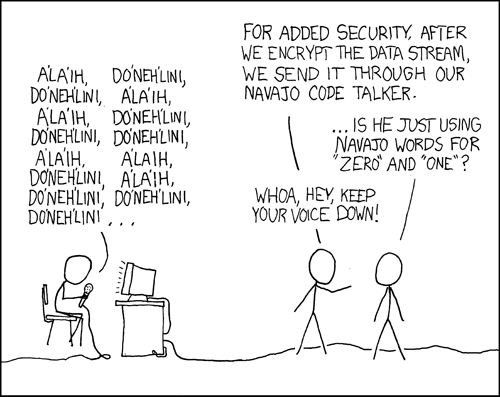| Announcements |
|---|
| Important Links |
|---|
| Instructor and Meeting Times |
|---|
Email: nmcnew@towson.edu
Office hours: Tuesdays and Thursdays 11-11:50, Wednesdays 4:30--5:30 and by appointment
Office: 326 (2 × 163) 7800 York Road
Lecture: Tuesday and Thursday: 5:00--6:15 YR 125
Note that you do not need an appointment to attend regularly-scheduled office hours. If you have a conflict you may make an appointment to meet outside those times.
| Course Description and Objectives |
|---|
A broad introduction to cryptography and its mathematical foundations. The course will also cover applications to computer-network security services and mechanisms (confidentiality, integrity, authentication, electronic cash, and others), and to various protocols in distributed computation.
Course objectives: The course provides a broad overview of the mathematical basis of modern cryptography and presents the main cryptosystems currently in use. Students are exposed to relevant chapters of number theory and computational number theory (modular arithmetic, finite fields, primality testing, quadratic residues, discrete logarithms, and others) at the undergraduate level. The course covers the most important cryptosystems (DES, AES, RSA) and the basic tools used in building security mechanisms (one-way functions, hash functions, message authentication codes, pseudo-random generators, bit commitment, hash functions, etc.). Some basic principles of cryptanalysis are presented as well. At the end of the course, students will have a good understanding of the theoretical foundations of cryptography and of the basic techniques for achieving different cryptographic services.
Prerequisites: COSC 236, and either MATH 263 or MATH 267, and junior standing or permission of instructor.
| Textbook |
|---|
| Homework/Quizzes |
|---|
Homework will consist of two components, written assignments and computational assignments in SageMathCloud.
Expect to spend a substantial amount of time studying and working on homework. The general rule is two to three hours outside class for each hour inside; this translates to about 6-9 hours of homework and personal study per week.
Quizzes will be given periodically covering aspects of the assigned reading and homework assignments (including recommended questions.)
Additionally, each student is responsible for writing up notes describing what was covered during one of the lectures during the term. These notes should be written up clearly using latex and submitted to the instructor within a week of the class period. Students are also encouraged to include additional examples/explanation. Notes will be posted for use by the rest of the class. Sign up for class periods here. Note: this will count as one homework assignment.
| Exams |
|---|
There are three scheduled exams: two midterms, held during class time, and the final exam.
| Midterm 1 | Midterm 2 | Final Exam |
|---|---|---|
| Tuesday, March 14 | Thursday, April 27 (tentative) | Thursday, May 18 5:15-7:15 pm |
| YR 125 | YR 125 | YR 125 |
| Evaluation |
|---|
Grades will be assigned based on homework, labs and exams. They will be weighted in the students final grade as follows:
| Component | |
| Homework, quizzes and typed course notes | 35% |
| Midterms (each) | 15% |
| Final Exam | 35% |
| Disabilities and Religious Observances |
|---|
Towson University is committed to providing equal access to its programs and services for students with disabilities, Students with disabilities should visit the Disabilities Services Web page, to learn about how to arrange for any appropriate accommodations. It is the student's responsibility to let the instructor know when he/she is a student with needs in this area. A memo from Disability Support Services (DSS) authorizing your accommodations will be needed.
If you have a religious observance that conflicts with your participation in the course, please meet with me before the end of the second week of the term to discuss appropriate accommodations.
| Course Policies |
|---|
On Exams: No assistance may be given or received except that you may ask the instructor for clarification of a problem. Calculators are not permitted.
On Homework: You are permitted and encouraged to collaborate with other students on the homework. However, after discussing the problems, you must write up the final solutions in your own words. You may use calculators and approved software. Additionally, you may consult your class notes and text. It is not permitted for someone to provide the answers for you. It is also not permitted to submit answers found on the internet as your own work.
See this page for more about plagiarism and how to avoid it.Class attendance is expected. If you miss a class, it is your responsibility to get the material and the homework assignment from your fellow students.
Diversity Statement: Towson University values diversity and fosters a climate that is grounded in respect and inclusion, enriches the educational experience of students, supports positive classroom and workplace environments, promotes excellence, and cultivates the intellectual and personal growth of the entire university community.
